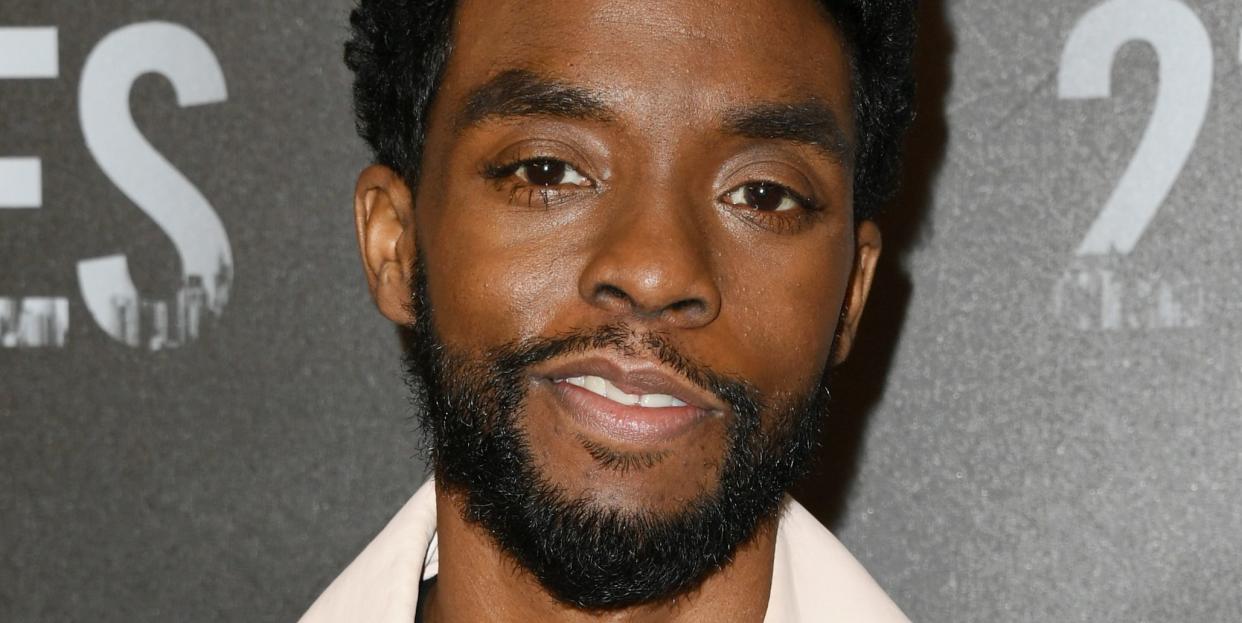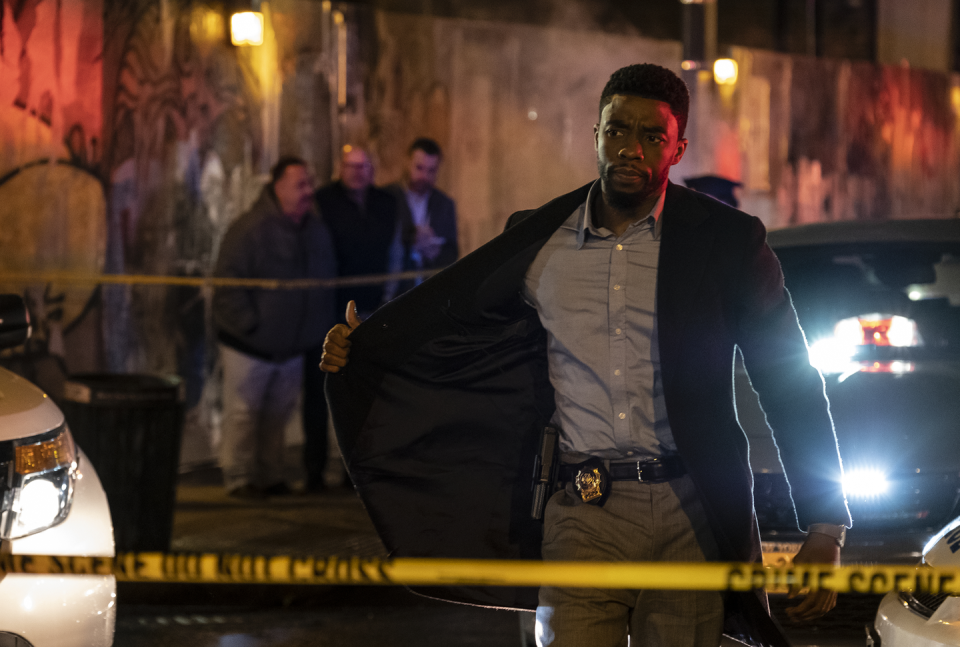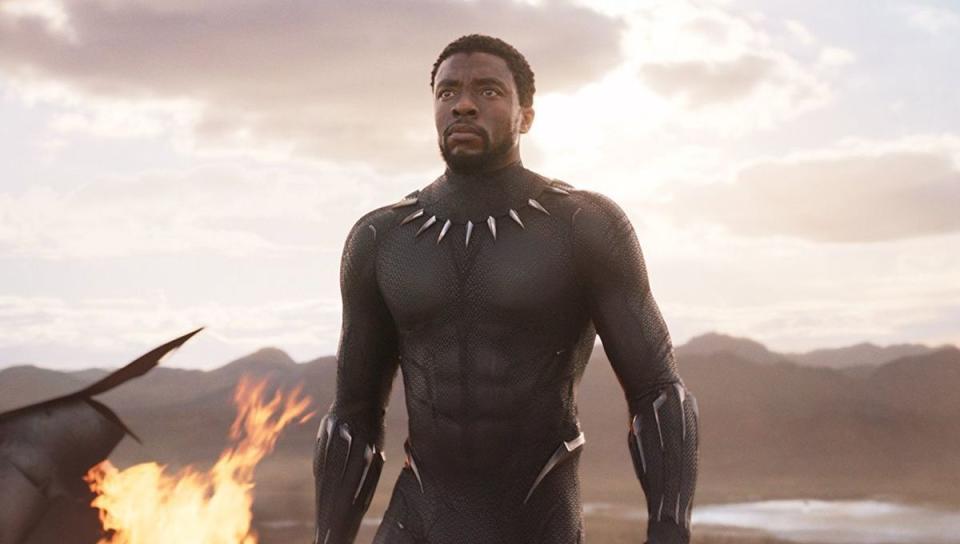Chadwick Boseman Talks '21 Bridges', Marvel And How 'Black Panther' Changed Hollywood

Four Marvel films in three years does strange to an actor's star power. Before Chadwick Boseman took his first trip to Wakanda, in 2016's Captain America: Civil War, he was bubbling under, the best thing in a handful of well-reviewed but low-impact biopics that, if they didn't set casting directors phones alight, certainly marked him out as one to watch. And then Marvel called. He was cast as T'Challa, young king of Wakanda, first in Civil War, then Black Panther, then the final two Avengers films. Within three years, his CV got an almost-$7 billion box office boost.
Three of those films were guaranteed blockbusters. Black Panther wasn't. It was a black-helmed, black-starring afro-futurist masterpiece, which broke records and shattered Hollywood's long-held notion that tentpole features could only succeed with a white face at the top of the poster.
Its success has given Boseman the power not just to pick his projects, but also to steer them. His latest – 21 Bridges – sees him star and produce, alongside the Russo Brothers, who directed him in Civil War and Avengers: Endgame. It's the first time the trio have worked together since Endgame, and is also the first feature for all three since wrapping up that particular phase of the Marvel Cinematic Universe. No pressure, then.
In 21 Bridges, Boseman plays Aaron Davis, an NYPD Detective who leads a city-wide manhunt for two cop killers. As his quarries try to flee Manhattan, Davis shuts down every bridge, subway tunnel and river crossing to cut off their escape. So far, so good-guys-versus bad-guys. But during the manhunt Davis discovers a conspiracy that blurs the lines between the criminals he’s chasing and those who end up chasing him, which is the kind of grey area that most superhero films are fairly light on.
In other words, 21 Bridges is a stylistic shift to the kind of films that Boseman grew up watching and which he still loves, as he told us when we sat down with him ahead of its UK release.

21 Bridges is your first lead role since Black Panther. How did it feel to return to a non-Marvel role after the past couple of years?
I mean, it’s refreshing. It’s a relief. I enjoy doing what I do with Black Panther, but I also enjoy not having to put on a suit or train like a professional athlete. You know, this is the type of movie that I enjoy watching the actors that I love do. It’s kind of like, you want to see how you would do it. And not in a copying way, but in a, “How do I define this in my own way?” So it was great to have that challenge, and to have something that was unfamiliar to me that I can dive into.
Were there any films or characters that you drew from for inspiration? Or did you want to put your own stamp on things?
It’s a little bit of both. For me, I always want to start from what’s real, so I started with real police officers and detectives. At first, we had a script, and that script was being rewritten when I started doing my research. So I wasn’t looking at the script at all or watching any movies. I just wanted to be around cops. I found a specialist in LA who would take me to the firing range and let me fire blanks. Obviously, we couldn’t use live rounds, but you need to know what it feels like to fire and handle these weapons, and what the responsibility and danger of it is. We were firing about 500 rounds a day hitting real targets, figuring out how you would pull this weapon, how you would pull it with a coat on, how to draw, and finding out what’s the best way to do that.
So that was the first thing. The physicality gets you in the mindset and helps you to understand what they see. For instance, when I’m holding my weapon, if my eyesight is coming from one direction I can’t see what’s happening in the opposite direction. I can only see if I turn and aim the weapon at you. So you need a mindset and a focus and it was important for me to understand that physically.
We also talked a lot about what it meant to be an officer, what your personal life is like, and what the job is. I did ride-alongs once I got to New York with detectives. That influenced the character and what was written because I’m sharing that information with the writer as he’s writing the script.
Once you’re in production, and you’re now sitting around and doing night shoots, that affected what movies I watched. We were all on a night schedule, and I didn’t get a good night’s sleep for a good five months after we finished as I couldn’t get back on the regular schedule. We just started watching all of the old movies from the Seventies, Eighties, and Nineties. You’re watching The French Connection and Heat and Seven and all these great films. That’s where the movies came in and I relished in making a movie like that while I was shooting.

Watching those films and seeing how they portray different characters, how did you ensure that 21 Bridges followed on from those?
I think it’s about making sure that it is character-driven and that, from a producer standpoint, what actors are you going to cast in these roles? Having an input on that, if they say “We want J.K. Simmons”, I didn’t have any problems with that! The other roles, like casting Sienna Miller, Stephan James, Taylor Kitsch – I was part of those arguments to get the cast that we have. As a producer, it’s about the film and direction but also the actors that emerged from those films.
Producing alongside you were the Russo brothers. What was it like to reunite with them, and what did you learn from a production standpoint?
This all started because, the night of the Avengers: Infinity War premiere, they came to me and said “We have a script for you”. You know, I’d been killed and to ease my pain! But no, I knew I was coming back [to Black Panther] at that point. It did feel good to know they still wanted to work with me. They introduced me to Brian Kirk to see how I’d collaborate with him and that surety of that made me say “Yeah, I want to do it”.
The Russo brothers know what they want. They know when something is working or not and they have a very strong opinion about how to make things work. They weren’t overbearing with Brian either. As they are directors, they know the type of room and space that you need to do what you have to do. But anytime they were needed to come in and solve a problem, they did. They would show up when we needed to shoot multiple things and they’d go and shoot that and be part of that second crew. And, in post-production, just seeing cuts and making good changes and edits. They were part of all of that and you trust it because they’ve made movies that are successful.
What are your hopes for 21 Bridges? Are you hoping that it’ll be up in the pantheon of New York cop movies years down the line, or do you just want fans to go and enjoy the film?
I can’t control the legacy of it. That’s something you let take care of itself. I just want people to go and have an experience. This is a movie that’s better seen in the theatre than at home. If you’re in the cinema, you have that shared experience. You get to sit on the edge of your seat in a different way and it’s the reason why we like to go and see films. I also feel like it’s the type of film that, once you’ve seen it that way, you have the nostalgia of wanting to see it again. It’s the same way that I described watching the movies I mentioned earlier. Because you have the actors that you have, the performances hold that weight and status of it. That’s what I want, and I can’t ask for anything else.
Black Panther was this iconic cultural moment in the film industry. In the wake of its game-changing impact for representation and diversity, have you noticed any actual progress or change?
I’ve noticed change. I’ve seen a willingness of production companies and studios to castings in a way that they wouldn’t normally do. You can’t make certain statements about a black lead, or a black cast, or having a certain number of people of colour – it’s not just black actors – anymore. In fact, it’s been proven that audiences want to see difference. They want to see variety and a world that reflects them whether it be race, gender, or sexuality. They want to see those things, so I think people are looking for opportunities in storytelling now.
Separate to that, but adding to it, is the business of distribution. It’s increased the opportunities as there are more things being shot and being seen in more places thanks to streaming. I think it’s the combination of variety, opportunities, and distribution that makes it different.
At the same time, I can’t say that everything has changed. The business is finding itself, and finding its value, so it’s still in the balance. I’ll also say that I’m in a unique position where I get to see the front and back of those things. There are a lot of people that haven’t broken through yet, and who are still trying to find their way and trying to get through certain prejudices. I have to acknowledge that, but they have more opportunities to do it.
Is there anything you can say about Black Panther 2 yet?
The only thing I can say is that, for people who are hungry, the food is being prepared. I’m sorry I can’t say more!
21 Bridges is in cinemas from 22 November.
Like this article? Sign up to our newsletter to get more delivered straight to your inbox
You Might Also Like

